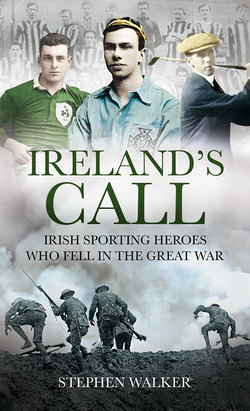Читать книгу Ireland’s Call - Stephen Walker - Страница 10
На сайте Литреса книга снята с продажи.
ОглавлениеPrologue
30 APRIL 1915
In the Dublin sunlight the men marched out of their barracks accompanied by the band of 12th Lancers and pipers from the Officers’ Training Corps of Trinity College. With their straight shoulders and swinging arms they moved in perfect step, weighed down by their kitbags and heavy packs.
Family members and well-wishers lined the route, shouting encouragement and applauding as they all marched by.
At the Four Courts, where the day’s proceedings had ended, barristers, some still dressed in their gowns, spotted familiar faces and roared approval. A large crowd gathered at O’Connell Bridge, and as the procession went by, hats, handkerchiefs and scarves were thrown into the air. Occasionally, women stepped away from the pavements and thrust sweets, cigarettes and rosaries into the hands of the soldiers. There was an air of celebration, but it was tinged with a feeling of finality.
For many men of the Royal Dublin Fusiliers, this was their last glimpse of the city of their birth. It was emotional as they passed the offices where they had once worked, and as they marched they acknowledged the cheers. A number of soldiers tied Union Flags and the Irish Harp Flags on their bayonets, and as they raised their standards the crowd responded.
For the ‘Pals Battalion’, this was the final goodbye. It was a last chance for Dubliners to acknowledge their own. A year later it would all be very different, the streets echoing the sounds of armed rebellion.
The march ended at North Wall, where a passenger steamer was docked, ready to take the men to Holyhead in Wales. After they boarded and prepared for the journey, there was one last important act before they set sail.
Frank Browning, the President of the Irish Rugby Football Union, who had been the inspiration behind their formation, was on the quayside to meet the men. They had played rugby and socialised with him, and as their friend and mentor he had recruited many into the ranks. Before they left Ireland he wanted to wish them well. It would be the last time they would ever see him. Within a year, Browning would be dead, shot during the Easter Rising of April 1916.
As the light began to disappear, Frank Browning boarded the ship, and after dozens of handshakes he said his goodbyes and wished his friends good luck. He was the last to leave the vessel, and watched as the Dubliners set sail. Within weeks they would be the target of Turkish snipers on the beaches of Gallipoli. The 7th Battalion of the Royal Dublin Fusiliers contained doctors, architects, lawyers and other men, from across the city and beyond.
In peacetime many played rugby matches together, and through the camaraderie of sport became friends. When war was declared, they enlisted together and regularly practised their drills on the turf of Lansdowne Road.
Once they were teammates, but now they were comrades, heading off to war.
